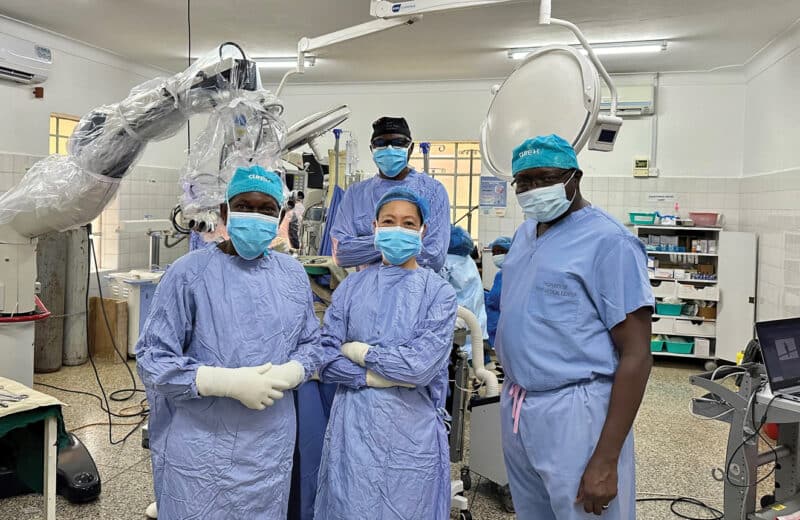So many fad diets, medications and supplements promise the dieter’s holy grail: boosting your metabolism so you can burn energy faster and lose weight quicker. But, unfortunately, it’s not that simple. There’s no way to miraculously boost metabolism. However, some food, fitness and daily activity modifications can help to an extent.
“At present, there are no medications or supplements that are proven to boost metabolism and are also approved by the Food and Drug Administration to be safe and effective for weight management,” says Emily Smith, MD, an endocrinologist at UI Health.
Metabolism is the set of chemical reactions in your body that keeps you functioning well, including the processes that convert what you eat and drink into energy. You might think of metabolism in relation to body weight only, but your metabolism is also responsible for growth, reproduction and elimination of waste products. It regulates body temperature and transports substances into and out of your cells.
“Metabolism encompasses the energy required to sustain all bodily functions, spanning from the upkeep of each single cellular unit all the way through to that required for complex human thought,” Smith says. “An individual’s metabolism is influenced by genetics, lifestyle and macro and micronutrients that are consumed daily.”
Beef up your protein
Digesting, absorbing and processing foods requires energy. The body burns calories to break down food you’ve eaten, and it converts those calories to heat in a process called thermogenesis.
This process “contributes a small percentage of your energy expenditure, but it’s a marginal contribution,” explains Audra Wilson, RD, LD, a bariatric dietitian at the Northwestern Medicine Metabolic Health and Surgical Weight Loss Center at Delnor Hospital.
It takes slightly more energy, and burns a bit more calories, to break down protein than to break down carbohydrates and fat. Protein has other benefits for dieters too. Because protein increases feelings of satiety or fullness and suppresses the appetite-stimulating hormone ghrelin, it squelches the desire to overeat.
“Shifting calorie consumption to include more protein and less carbohydrates and fat may indeed increase metabolic rate,” Smith says.
The type of fat may matter, too. “When consuming fats, those higher in a type of fat called medium chain fatty acids — like coconut and palm oil — may be associated with a very small increase in metabolism,” she adds.
Spice it up
Some plant compounds may provide a slight boost in metabolic rate. Red chili peppers contain capsaicinoids — pungent chemical compounds that have the potential to slightly increase energy expenditure. However, the downside is that these compounds aren’t tolerated very easily, and some individuals may not be able to handle the spiciness.
“Some have suggested that spicy foods boost metabolism via capsaicin,” Smith says. “While the data on this are conflicting, adding heat to food does appear to decrease total caloric intake during that meal, so it may be beneficial for weight loss overall.”
Green tea and coffee contain caffeine, which is a central nervous system stimulant that can slightly boost metabolism. Green tea contains catechins, which researchers believe to be responsible for an increase in thermogenesis; you burn more calories after drinking it.
“Caffeine and some types of teas may have a moderate impact on metabolism primarily through increasing heart rate and alertness,” Smith says. “In particular, green tea has been shown to impart a mild increase in energy metabolism.”
Though some substances may make a mild difference in boosting metabolism, they will not provide long-lasting effects, Wilson says.
“While some foods that contain caffeine or lots of spice may increase metabolism for a few seconds, the effect is so small that it would not significantly impact total energy expenditure or have any effect on weight loss,” she explains.
Drink up
Water is essential for metabolism. Even mild dehydration can make your metabolism sluggish, so increasing your water intake may help with weight loss. Participants in a study who increased their water intake by 1.5 liters a day over eight weeks showed a decrease in weight and body mass index. The study was published in 2013 in the Journal of Clinical and Diagnostic Research.
“Water consumption may temporarily increase metabolic rate, though my assumption is this is more likely just a normal reaction to putting liquid into your digestive tract,” Smith explains.
The temperature of the water may make a difference. Drinking cold water — just like shivering in a cold climate — can result in minor increases in energy expenditure, according to a 2019 study in The Journal of Sports Medicine and Physical Fitness.
Move your body
Exercise is a natural metabolic booster, especially high-intensity interval training, as well as strength-training that builds muscle mass.
“Building muscle can have a significant impact on resting metabolic rate,” Wilson says. In other words, the more muscle mass you have on your body, the more calories you will burn at rest.
You don’t need to go to the gym to move. Daily living activities — cleaning, running errands and lifting laundry, for example — can help boost metabolism.
“All of that physical activity you do throughout the day that you would not necessarily consider formal exercise creates non-exercise activity thermogenesis or NEAT,” Smith says.
Even vacuuming, chasing toddlers, fidgeting at your desk and tapping your toes while waiting in line can help. Small lifestyle changes, such as using a standing desk, parking farther away from the store, standing on the train or stretching during commercial breaks adds up to increased energy consumption every day.
The bottom line: There’s no miracle way to boost metabolism. The tried and true metabolic boosters include regular daily activity, balanced meals and proper hydration. But try spicing it up a little. Coffee and green tea can’t hurt, either.













